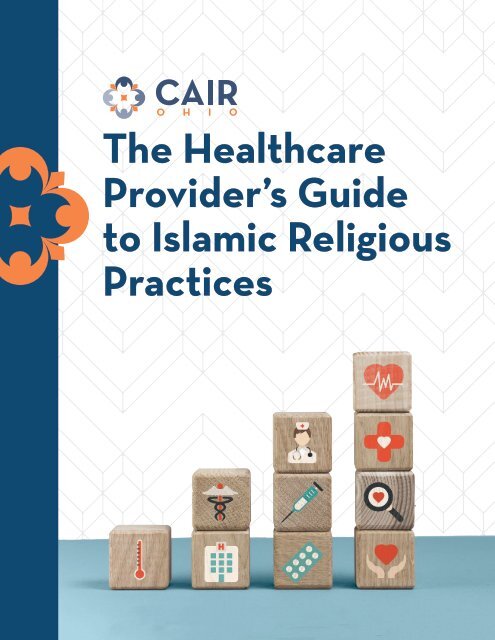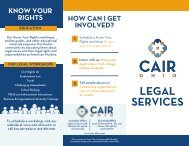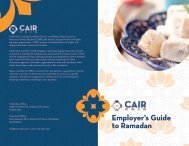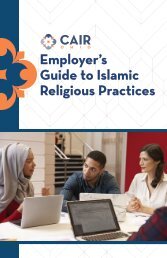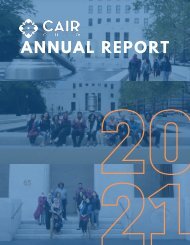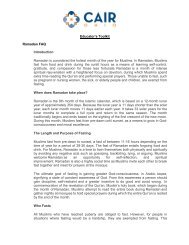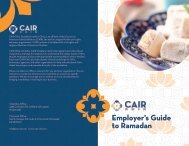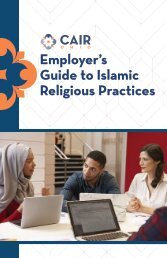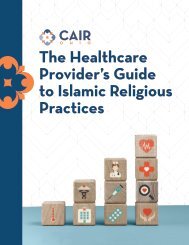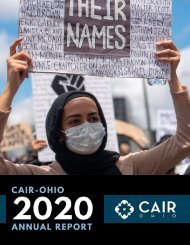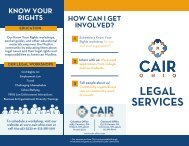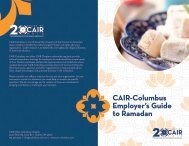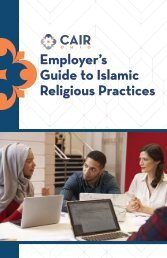CAIR-Ohio-Healthcare-Providers-Guide (2022)
You also want an ePaper? Increase the reach of your titles
YUMPU automatically turns print PDFs into web optimized ePapers that Google loves.
The <strong>Healthcare</strong><br />
Provider’s <strong>Guide</strong><br />
to Islamic Religious<br />
Practices
ACKNOWLEDGMENTS<br />
<strong>CAIR</strong>-<strong>Ohio</strong> is a chapter of the Council on American-Islamic Relations (<strong>CAIR</strong>), America’s largest Muslim<br />
civil liberties and advocacy organization. Its mission is to enhance the understanding of Islam, protect civil<br />
liberties, promote justice, and empower American Muslims.<br />
The information in this guide is designed to assist healthcare providers in developing policies and procedures<br />
aimed at the delivery of culturally competent patient care and to serve as a guide for the accommodation<br />
of religiously mandated practices of Muslim patients. This guide is not comprehensive; rather, it is intended<br />
to serve as a general outline of Islamic practices, beliefs, and customs. As with any religion, the degree<br />
of religious adherence varies based on the individual’s personal level of religiosity. While this publication<br />
embodies information gathered from different sources and literature, it does not necessarily represent the<br />
opinions of <strong>CAIR</strong>-<strong>Ohio</strong>.<br />
<strong>CAIR</strong>-<strong>Ohio</strong> and other <strong>CAIR</strong> chapters nationwide regularly provide cultural competency trainings<br />
for healthcare professionals to understand the unique needs of their Muslim patients and to provide<br />
appropriate accommodations when needed. Each year, <strong>CAIR</strong>-<strong>Ohio</strong> distributes literature to agencies and<br />
other organizations in <strong>Ohio</strong> to facilitate cultural understanding and foster diverse environments.<br />
Please consider our office a resource for you and your organization. You are welcome to contact us<br />
whenever you need help or answers to specific questions. We also encourage you to contact us if you are<br />
interested in bringing a workshop or training to your institutions.<br />
CONTACT<br />
Columbus Office:<br />
4985 Cemetery Rd.<br />
Hilliard, OH 43026<br />
614.451.3232 | info@cair-ohio.com<br />
www.cair-ohio.com<br />
Cincinnati Office:<br />
5740 Gateway Blvd., Suite 201<br />
Mason, OH 45040<br />
513.281.8200 | info@cair-ohio.com<br />
www.cair-ohio.com<br />
SPECIAL THANKS<br />
We would like to especially thank Dr. Fadia Abaza from Toledo, <strong>Ohio</strong>, co-founder of ING MidWest, for her<br />
contributions to this publication. Please visit www.INGmidwest.org and www.ringmidwest.org for more<br />
information about her work.
TABLE OF CONTENTS<br />
SECTION I: INTRODUCTION 1<br />
U.S. Legal Protections of Religious Rights................................................................................................ 1<br />
Islamic View on Illness and Treatment...................................................................................................... 1<br />
Perspectives on Mental Health................................................................................................................. 2<br />
Hygiene........................................................................................................................................................ 2<br />
Ablution – Ritual Washing.......................................................................................................................... 2<br />
Daily Prayer................................................................................................................................................. 2<br />
Jumu’ah Prayer........................................................................................................................................... 3<br />
Islamic Holidays.......................................................................................................................................... 3<br />
SECTION II: ISLAMIC PRINCIPLES AFFECTING HEALTHCARE 4<br />
Ramadan Fasting......................................................................................................................................... 4<br />
Dietary Restrictions................................................................................................................................... 5<br />
Dress, Modesty, & Physical Contact......................................................................................................... 6<br />
Childbirth and Newborns........................................................................................................................... 7<br />
Assisted Reproductive Technologies........................................................................................................ 7<br />
Abortions, Contraception, & Stillbirth..................................................................................................... 7<br />
Embryo and Stem Cell Research.............................................................................................................. 8<br />
Blood Transfusion and Organ Donation................................................................................................... 8<br />
SECTION III: DEATH & DYING 9<br />
Palliative Care............................................................................................................................................ 9<br />
Spiritual Care............................................................................................................................................. 9<br />
Wills and Testaments................................................................................................................................. 9<br />
Definition of Death................................................................................................................................... 10<br />
Physical Care After Death....................................................................................................................... 10<br />
Funerals..................................................................................................................................................... 10<br />
Autopsies................................................................................................................................................... 10<br />
Assisted Suicide and Euthanasia............................................................................................................. 10<br />
SECTION IV: COMMUNITY HEALTH SERVICES 11<br />
Family Unit & Visiting Arrangements....................................................................................................... 11<br />
Imam/Muslim Chaplin............................................................................................................................... 11<br />
Home Visits................................................................................................................................................ 11<br />
SECTION V: GLOSSARY OF ISLAMIC TERMS 12
SECTION I: INTRODUCTION<br />
According to demographers, Islam is the world’s second largest faith, with more than 1.6 billion adherents<br />
worldwide. It is the fastest-growing religion in the U.S. with one of the most diverse and dynamic<br />
communities. Representing a variety of ethnic backgrounds, languages, and nationalities, Muslims are<br />
adding to the diverse character of patients. Many Muslim patients are new immigrants from various parts<br />
of the world and may experience language barriers. Therefore, healthcare providers should take time in<br />
explaining tests, procedures, and treatments to the patient and next of kin involved in the decision-making<br />
process. In some cases, it may be necessary to arrange for an interpreter.<br />
In order to provide optimal care, healthcare providers need to have an understanding of, and<br />
respect for, the beliefs and religious preferences of their Muslim patients. To avoid patient-provider<br />
miscommunication, mistrust, and perceived discrimination, healthcare providers should prioritize the<br />
patient’s needs while respecting his/her autonomy and religious views. When in doubt, healthcare<br />
providers should consult with the patient and the patient’s family to guide them on religious and<br />
cultural needs. It may be beneficial for healthcare providers to seek the assistance of Muslim healthcare<br />
providers and staff who can act as liaisons with Muslim patients.<br />
U.S. LEGAL PROTECTIONS OF RELIGIOUS RIGHTS<br />
Prayer, fasting, religious celebrations, dietary restrictions, and clothing requirements are some of the<br />
practices and beliefs of members of the Islamic faith. They are considered bona fide religious practices<br />
and beliefs, and those who practice them regard them as mandatory religious duties.<br />
The First Amendment to the U.S. Constitution and Article 1, Section 7 of the State of <strong>Ohio</strong> Constitution<br />
obligate government institutions to accommodate the religious beliefs and practices of patients. In<br />
private institutions this obligation to accommodate the religious beliefs and practices of patients is<br />
mandated by Title II of the 1964 Civil Rights Act and the <strong>Ohio</strong> Revised Code Chapter 4112.<br />
1<br />
ISLAMIC VIEW ON ILLNESS AND TREATMENT<br />
Muslims consider illness, like other life hardships, as a test from God, and often respond with patience<br />
and prayers. Islam has a spiritual and societal dimension with defining principles that safeguard human<br />
rights, honor, dignity, and the preservation of life. Trying to maintain good health is essential; as such,
a believer must seek medical aid to bring about cure and recovery, if at all<br />
possible. According to one saying of Prophet Muhammad, “no disease has<br />
been ordained except that it has a cure.”<br />
PERSPECTIVES ON MENTAL HEALTH<br />
American Muslims generally adhere to the dominant biomedical model<br />
of mental illness. A lack of understanding of the Islamic beliefs and rituals<br />
of Muslim patients by healthcare providers may be an impediment in<br />
establishing a therapeutic relationship. Some patients prefer to seek<br />
counseling from their Imam – an Islamic spiritual leader. A person diagnosed<br />
with severe mental illness or intellectual disability is absolved from all<br />
religious obligations in Islam.<br />
Tip: Mental health providers are<br />
encouraged to connect with a local Imam<br />
or Muslim organization for assistance in<br />
serving Muslim patients.<br />
HYGIENE<br />
Islam places great emphasis on hygiene in both spiritual and physical terms.<br />
In addition to the ritual cleansing before prayer, Muslims also follow other<br />
hygiene-related rules, including:<br />
− Washing with water after urination or defecation<br />
− Removing underarm and pubic hair<br />
− Keeping nostrils clean<br />
− Keeping fingernails trimmed and cleaned<br />
− Taking a full bath/shower, or ghusl, after seminal discharge, sexual<br />
intercourse, after menstruation, or post-natal bleeding<br />
Tip: A small container, such as a cup, bottle, or beaker, can be placed near<br />
the toilet to assist with washing. For a bedbound patient, a beaker of<br />
water or sanitary wipes are suitable for washing after use of a bedpan.<br />
ABLUTION – RITUAL WASHING<br />
Before prayer, Muslims rinse their mouth and nose and wash their hands,<br />
face, arms, and feet with water. This is called wudu, or ablution, and it is<br />
intended to physically cleanse the person before prayers are performed. It<br />
is performed in a restroom or another facility with running water and takes<br />
about two minutes. In hospital settings, some patients may require assistance<br />
with washing. The procedure may also take longer depending on mobility<br />
limitations.<br />
Patients with severely limited mobility may perform tayammum, or a symbolic<br />
ablution using dry earth, if no one is available to assist. Tayammum can also<br />
be performed when there are areas of the body that cannot come into<br />
contact with water for medical reasons, such as over a cast or bandage. The<br />
most common performance of tayammum involves patting the hands on<br />
clean, dry earth, sand, or rock and then wiping the face and both hands.<br />
DAILY PRAYER<br />
Islam urges Muslims to lead a “God-conscious” life. To that end, Islam<br />
prescribes that believers perform five daily prayers. Each prayer takes five to<br />
ten minutes and is completed during the following periods, which are based<br />
on the position of the sun:<br />
1. Fajr: Dawn, before sunrise<br />
2. Dhuhr: Midday, after the sun passes its highest point, until late<br />
afternoon<br />
3. Asr: Late afternoon until just before sunset<br />
4. Maghrib: Sunset until full darkness<br />
5. Isha: Darkness until midnight<br />
2
Tip: <strong>Healthcare</strong> facilities should consider allocating prayer space,<br />
such as a chapel or a private prayer/reflection room, for Muslim<br />
patients and visitors to perform prayers.<br />
The prayer itself includes specific recitations from<br />
the Qur’an and physical components of standing,<br />
bowing, and prostrating; all prayers are performed<br />
while facing towards Mecca (which is in the<br />
general northeast direction in the United States).<br />
Muslims may pray on a prayer mat or rug. During<br />
prayers, patients cannot respond to questions and<br />
will wait to respond until prayer is finished. In the<br />
event of an emergency, Muslims will, of course,<br />
stop their prayer to respond. Individuals with<br />
limited mobility may use a chair to complete some<br />
of the physical components of prayer. Patients<br />
who cannot stand, sit, or kneel may pray using<br />
head motions or eye motions while lying down.<br />
Women are exempted from prayer during times of<br />
postnatal bleeding or menstruation.<br />
Hospitalized patients and individuals in nursing<br />
homes may ask to be alerted of prayer times to<br />
fulfill this religious duty. Relatives and friends who<br />
visit patients at prayer times would appreciate it<br />
if healthcare providers could inform them about<br />
the nearest chapel or other designated spaces<br />
where prayers can be offered. These spaces should be clean, quiet, and dry, and should preferably offer some privacy; if possible,<br />
the prayer space should be free from images of people or religious icons. It should be large enough for Muslim worshipers to stand,<br />
bow, kneel, and prostrate.<br />
FRIDAY/JUMU’AH PRAYER<br />
Friday is the day for congregational prayer, or Jumu’ah. It is customarily understood to be mandatory for men and highly encouraged<br />
for women to attend. Jumu’ah lasts around one hour and takes place at the mosque during the midday prayer. It includes a khutbah, or<br />
sermon, delivered by the Imam. After prayer is complete, the worshiper will continue with the rest of his/her day. For the exact timing<br />
of Friday prayer, contact a local mosque or Islamic center.<br />
Sick persons are not required to attend congregational prayer. However, many Muslim patients, who are not contagious, may still<br />
wish to attend Jumu’ah in order to benefit from the khutbah and to connect with their community. Seniors in nursing homes would<br />
benefit from assistance in traveling to the nearest mosque for Jumu’ah prayers. Mosque administrators may be willing to help<br />
arrange for transportation and accommodation for the elderly or those with limited mobility.<br />
ISLAMIC HOLIDAYS<br />
Islamic holy days and festivals are determined according to the lunar calendar. Like the solar calendar, the lunar calendar has<br />
twelve months. However, a lunar month, marked by the appearance of a new crescent moon on the horizon, may last only twentynine<br />
days. A lunar year is about eleven days shorter than the solar year. This means that Islamic festivals occur about eleven days<br />
earlier each year and that the dates for significant holidays will change according to the Gregorian calendar.<br />
The major celebrations common to all Muslims are two Eid (Islamic festival)<br />
days. The first Eid day is celebrated on the day after the month of Ramadan<br />
(the month of fasting) and is called Eid al-Fitr (translated as the Festival of the<br />
Breaking of the Fast). The second is celebrated on the tenth day of the twelfth<br />
Islamic month and is called Eid al-Adha (Festival of Sacrifice). Eid al-Adha<br />
coincides with the timing of Hajj, the annual Islamic pilgrimage. Because the<br />
occurrence of Eid depends on the sighting of the new moon, the exact date<br />
cannot be determined with certainty until a few days before the holiday.<br />
Eid festivities include congregational prayer, gatherings with family and friends,<br />
and gifts and entertainment, especially for children. A typical greeting on these<br />
occasions is “Eid Mubarak” or “blessed Eid.” Another acceptable greeting<br />
is “happy Eid.” Since Eid days are devoted to spending time with family and<br />
friends, elective medical tests and other procedures should be scheduled<br />
around these holidays whenever possible. Hospital administrators<br />
should consider adding Islamic holidays to their calendars.<br />
3<br />
Tip: It may be beneficial to consult with local<br />
Islamic centers for the exact dates.
SECTION II: ISLAMIC PRINCIPLES AFFECTING HEALTHCARE<br />
RAMADAN FASTING<br />
The month of Ramadan, the ninth month of the Islamic lunar calendar, is the time when Muslims are<br />
required to fast. Fasting during this month is compulsory for all healthy Muslims who have reached<br />
puberty and who are physically and mentally fit. The dates of this fast change each year, so Ramadan will<br />
eventually rotate throughout the full solar calendar.<br />
Ramadan is a period of self-restraint and a time to focus on moral conduct and one’s relationship with<br />
God. During this month, Muslims refrain from eating, drinking, and sexual activity from before dawn until<br />
sunset. It is recommended for Muslims to consume a pre-dawn meal before fasting the whole day.<br />
Generally, an illness exempts a person from fasting if the performance of the fast would exacerbate the<br />
illness or condition. Exemptions to fasting also include menstruation, postpartum, travel, and severe<br />
illnesses; pregnant and breastfeeding women are exempt if fasting poses a risk to their health or the<br />
health of the fetus. Each situation needs to be judged on its own merits; fasting should not become<br />
harmful, detrimental, or injurious to one’s health. Fasting does not inhibit the provision of emergency<br />
medical care.<br />
Tip: <strong>Healthcare</strong> providers are recommended to<br />
use professional judgement regarding fasting<br />
based on the individual’s health and risk factors.<br />
4
The following medications/medical treatment will not break a Muslim’s fast: 1<br />
− A drop in the eye or the ear, ear washing, nasal drops or puffing, provided that the liquid reaching the throat<br />
is not swallowed<br />
− Tablets placed under the tongue to treat a chest angina or any other illness, provided nothing is swallowed<br />
− Anything introduced into the uterus, be it suppositories, bath water, ureteroscope, intra vaginal auscultation,<br />
or an intrauterine device (IUD) or any other similar device<br />
− Anything introduced into the urinary tract of a man or a woman: probe, ureteroscope, radio-opaque substances,<br />
solutions for cleaning the bowel<br />
− Tooth extractions, dental fillings or cleanings, and cleaning one’s teeth with a toothpick or a toothbrush,<br />
provided nothing is swallowed<br />
− Mouthwash, gargle, mouth-spray, provided nothing is swallowed<br />
− Subcutaneous, intramuscular or intravenous injections, excluding any perfusions or injection of nutritious fluids (serums)<br />
− Oxygen, inhalers, nasal sprays, and patches<br />
− Anesthesia by vaporization and intravenous injections, provided nutritious fluids are not injected to the patient<br />
− Whatever penetrates into the body through the skin, like creams, ointments, or cutaneous patches containing<br />
medicinal or chemical substances<br />
− Introduction of a catheter for coronagraphy of heart vessels and other organs<br />
− Biopsy of the liver or other organs without administration of any solutions or liquids<br />
− Fibroscopy, laparoscopy, or gastroscopy without absorption of liquids or other substances<br />
− Introduction of any instrument or substance into the brain or spinal cord for treatment<br />
− Involuntary vomiting<br />
− Injections and blood tests<br />
− Physical examinations including rectal and vaginal examinations for medical purposes<br />
− Pessaries, douches, and suppositories<br />
The following medications/medical treatments will break a Muslim’s fast:<br />
− Any medication or medical treatment administered<br />
as a supplement for the purposes of providing nourishment<br />
− Any medication purposefully swallowed<br />
− Induced vomiting<br />
− Kidney dialysis<br />
Tip: Patients struggling with eating<br />
disorders, such as anorexia nervosa or<br />
bulimia, should be closely monitored<br />
during Ramadan fasts.<br />
DIETARY RESTRICTIONS<br />
Islam has specific rules about the types of food that are permissible (halal) and<br />
impermissible (haram). The Qur’an prohibits consumption of alcohol, pork, and any<br />
pork by-products or derivatives. Therefore, practicing Muslims are careful about the<br />
food they consume and how it is prepared. Some Muslims follow halal standards in<br />
the slaughter and preparation of meat and poultry, which are similar to Jewish kosher<br />
preparations but are not interchangeable.<br />
Tip: <strong>Healthcare</strong> centers can order halal food options from certified halal food<br />
providers. If this is not possible, patients must be given choices that meet<br />
Muslim dietary requirements such as vegetarian, eggs, diary, and fish.<br />
5<br />
1) The Council of the Islamic Fiqh Academy, holding its Tenth session in Jeddah (Kingdom of Saudi Arabia), from 23 to 25 Safar 1418H<br />
(28 June to 3 July 1997); RESOLUTION N° 99/1/10
Some objectionable food items include:<br />
− Pork, pork by-products, or any food items containing pork<br />
or pork by-products<br />
− Gelatin and lard<br />
− Lipase and pepsin<br />
− Blood and blood by-products<br />
− Alcohol and food prepared with alcohol<br />
Most varieties of fish are considered halal by default and are generally consumed by most Muslims in<br />
place of meat options.<br />
Many medications such as cough syrups often contain alcohol; if possible, alternatives to these<br />
medications should be provided. For example, the pediatric formulations of most cough syrups do not<br />
contain alcohol and can be given to adult patients once dosage is adjusted. If no suitable alternative<br />
is available for medicines or vaccines of porcine origin or medicines containing alcohol, then Muslim<br />
patients must be made aware of the medicine’s or vaccine’s origins and contents, so they can make an<br />
informed decision.<br />
Tip: Physicians<br />
should avoid<br />
prescribing<br />
medical pills<br />
coated with porkextracted<br />
gelatin.<br />
DRESS, MODESTY, & PHYSICAL CONTACT<br />
Islam prescribes that both men and women behave and dress modestly. Muslims believe that an emphasis on modesty encourages<br />
society to value individuals for their wisdom, skills, and contribution to the community, rather than physical appearance. There are<br />
several ways in which Muslims express such teachings, varying widely by culture and individual practices. Staff and administration<br />
should ensure that all healthcare providers respect the diversity of the Muslim community and the variations in how these<br />
practices are observed.<br />
Many adults past the age of puberty place certain limits on relations between members of the opposite sex. For example, some<br />
Muslims prefer not to shake hands or hug people of the opposite sex. In some cultures, prolonged eye contact between individuals<br />
of the opposite sex is considered rude. This should not be taken as an insult, but instead regarded as a sign of personal modesty<br />
and politeness. Muslim women tend to prefer an all-female attendance (physicians, midwives, doulas, nurses, etc.) during childbirth.<br />
However, it is permissible in Islam for male healthcare providers to attend to a pregnant woman. There is no Islamic teaching that<br />
prohibits fathers from attending the birth of their child; this is left up to personal choice.<br />
Muslim patients may request their medical examinations or procedures to be performed by healthcare providers of the same<br />
sex. If a healthcare provider of the same sex is not available, healthcare providers should show great sensitivity, understanding,<br />
and respect for modesty concerns. Alternatively, Muslim patients may seek the presence of a family member or friend during<br />
these examinations or procedures. <strong>Healthcare</strong> providers should always be ready to explain the need for more invasive medical<br />
examinations, if the need arises.<br />
6
For Muslim Women<br />
When in public, Muslim women often wear loose-fitting, non-revealing<br />
clothing and a headscarf known as a hijab. This attire, which may vary in style,<br />
usually includes covering the hair, neck, and body. Depending on personal<br />
preference, some women also opt to completely cover their hands and feet;<br />
to wear long skirts, rather than trousers or pants; or to wear loose-fitting<br />
robes, such as abayas. Some Muslim women may wear a face veil, commonly<br />
referred to as a niqab. As with any religion, the degree of religious adherence<br />
varies based on the individual’s personal level of religious observance.<br />
For Muslim Men<br />
Muslim men, like women, are usually reluctant to expose their body for<br />
physical exams. Requesting permission before uncovering any part of the<br />
body and exposing as small an area as possible is highly recommended. Some<br />
Muslim men may wear a small head covering, called a kufi. Many men choose<br />
to grow beards for religious reasons.<br />
CHILDBIRTH AND NEWBORNS<br />
Following prophetic tradition, Muslim parents whisper the Adhan (the call to<br />
prayer) into the right ear of a newly born baby, which takes no more than 5<br />
minutes. This ensures that the first words the infant hears are an invitation<br />
to follow God. Another Islamic tradition, called Tahneek, that is performed<br />
shortly after birth involves placing something sweet (e.g., dates) on the<br />
infant’s palette. Additionally, Islam recommends that mothers breastfeed<br />
their children for up to two years of age.<br />
Circumcision is required only of male babies and usually takes place within the<br />
first seven days of life, unless a medical reason requires the procedure to be<br />
postponed. Islam strictly prohibits the practice of female circumcision or genital<br />
mutilation. Religious authorities agree that this practice is irreligious and should<br />
be eradicated where it occurs. If providers are faced with such a request, local<br />
Muslim leaders may advise the family and educate them about the matter.<br />
Tip: Doctors and nurses should not demand the<br />
removal of any piece of clothing unless there is<br />
a clear need for it.<br />
Tip: If hospital gowns do not provide the level<br />
of modesty the Muslim patient prefers, he/she<br />
might wear additional clothing, like a cardigan,<br />
to accommodate. In such circumstances,<br />
communication between providers and patients<br />
is key.<br />
Tip: Staff may hang a “please knock” sign on the<br />
patient’s door, as to allow the Muslim patient<br />
the opportunity to cover before someone enters<br />
the room.<br />
ASSISTED REPRODUCTIVE TECHNOLOGIES<br />
Artificial reproductive technology and procedures, including in vitro<br />
fertilization (IVF), are only permissible between husband and wife during<br />
the span of an intact marriage. The use of donor sperm is strictly prohibited<br />
in Islam. The use of sperm that has been cryopreserved is prohibited if the<br />
father has died. Surrogacy involving a third person is not permissible.<br />
ABORTIONS, CONTRACEPTION, & STILLBIRTH<br />
In Islam, abortion is prohibited; however, there are exceptions to this rule. For<br />
example, religious authorities all agree that abortion is permissible if continuing<br />
the pregnancy threatens the mother’s life or health. Additionally, abortion is<br />
permitted if the pregnancy was a result of rape or incest. Some schools of<br />
thought permit abortion in the early stages of fetal development, particularly<br />
when the pregnancy is less than 120 days old, because they believe that fetal<br />
viability is not possible at this stage in the pregnancy. For many schools of<br />
thought, the death of a fetus past the age of 120 days is considered the death<br />
of a viable baby.<br />
In the event of a miscarriage, intra-uterine death, or stillbirth of a fetus past<br />
120 days, Muslim parents may wish to observe full funeral rites.<br />
Contraception is permitted, provided that it is mutually agreed upon<br />
between husband and wife. Permanent contraceptive methods, such as<br />
vasectomies and tubal ligations, are allowed only when the woman’s health<br />
is at risk from additional pregnancies and when a genetic disease of the<br />
husband or the wife poses high risk of being transmitted to the fetus.
EMBRYO AND STEM CELL RESEARCH 2<br />
Embryonic experimentation, genetic testing, and<br />
cord blood and stem cell research are acceptable<br />
in Islam under certain conditions.<br />
The Islamic position on stem cell research can be<br />
outlined as follows:<br />
− Fertilized eggs are not considered fully<br />
human before development (3-month point)<br />
and implantation, since the fertilized egg<br />
would not survive and develop into a<br />
human being without implantation.<br />
− The supernumerary embryos produced<br />
through IVF cannot be donated to other<br />
couples; when they are not used by the<br />
original couple, they are left to die/be<br />
destroyed. Rather than destroy them, it is<br />
preferable that they be used for stem cell<br />
research.<br />
− Creating human embryos for the sole<br />
purpose of research is prohibited.<br />
− Cord blood banking is permissible with the<br />
permission of the parents.<br />
− It is forbidden to obtain or use stem cells if the source is forbidden; such sources include:<br />
- Fetuses intentionally aborted without legal and/or medical reasons;<br />
- Intentional fertilization between a donated ovum and donated sperm; and<br />
- Therapeutic cloning.<br />
Stem cell research may only be conducted on stem cells derived from the following:<br />
− Frozen embryos that were created for the purpose of IVF and would otherwise have been destroyed<br />
− Adults who consent as long as it does not inflict harm on the adults<br />
− Children whose guardians consent for a legal benefit without inflicting harm on the minor<br />
− Placenta or umbilical cord blood, with the permission of the parents<br />
− Spontaneously aborted embryos, or those aborted for an acceptable cause, and with parental permission<br />
− Excess fertilized eggs produced during the course of IVF and donated by the parents, as long as they are not used to produce<br />
impermissible pregnancies (as noted above in “Assisted Reproductive Technologies”)<br />
Tip: Consult with<br />
the patient and<br />
his/her family or<br />
guardian regarding<br />
blood transfusions,<br />
transplant options,<br />
and organ donations.<br />
BLOOD TRANSFUSION AND ORGAN DONATION<br />
Blood transfusions are permissible. However, some patients may prefer direct blood donations from<br />
family members instead of anonymous donors.<br />
Organ Donation is permissible but has to be done under the following guidelines:<br />
− Consent from the donor and the recipient must be obtained.<br />
− No commercial dealing of the organs – sale of organs by any party is forbidden.<br />
− No permanent harm to the donor must occur.<br />
− Donation of sperm or ovum is not permitted.<br />
− Transplant of sex organs is forbidden.<br />
− Cadaver donation is permitted if mentioned in the person’s will.<br />
− Transplant of an organ from a dead person is permissible if specified in their will.<br />
2) The information in this section is based on research conducted by Dr. Hossam Fadel, an obstetrician gynecologist in Augusta, GA.<br />
8
SECTION III: DEATH & DYING<br />
PALLIATIVE CARE<br />
Caring for the seriously ill is more than just reducing pain and suffering; it is<br />
also about easing the transition between life and death.<br />
Because Islam recommends and obliges Muslims to seek treatment when<br />
they fall ill, medications and medical technology should be used to enhance<br />
a patient’s quality of life whenever possible. Islam forbids any acts that<br />
expedite death of the patient. However, maintaining a terminal patient, who<br />
is in a vegetative state on artificial life support, for a prolonged period is<br />
also not encouraged. In times of uncertainty, consulting an Islamic scholar or<br />
leader and a specialist physician is always an option.<br />
Tip: In the event that the family cannot be<br />
present, a local Islamic leader can console the<br />
patient.<br />
Tip: <strong>Healthcare</strong> providers should encourage<br />
their dying patients to put all their requirements<br />
about the funeral and burial in writing.<br />
Tip: <strong>Healthcare</strong> providers should discuss<br />
advanced care planning and end of life issues<br />
with patients and their families.<br />
9<br />
SPIRITUAL CARE<br />
Spiritual care is vital in caring for Muslim patients because it ensures a<br />
sense of calmness and well-being. Muslims will ask God for His help during<br />
these difficult times; they seek increased patience, forgiveness, peace, and<br />
gratitude. Reciting or listening to the Holy Qur’an is believed to enhance<br />
psychological and spiritual health. Consequently, Muslims will keep a copy of<br />
the Holy Qur’an to read or listen to on their electronic devices.<br />
WILLS & TESTAMENTS<br />
Islam places great importance on both the laws of inheritance and to create<br />
a valid will and testament. <strong>Healthcare</strong> providers should encourage their dying<br />
patients to put all their requirements about the funeral and burial in writing.<br />
They should discuss advanced care planning and end of life issues with<br />
patients and their families.
DEFINITION OF DEATH<br />
A person is considered dead when:<br />
− A physician has determined that the cardiopulmonary function has come to a permanent stop.<br />
− A specialist physician has determined that the function of the brain, including the brain stem, has come to a permanent stop.<br />
Islam does not require treatment to be provided if the treatment merely prolongs the final stages of a terminal illness. Under these<br />
circumstances, it is permitted to disconnect life support devices even if they are used to prolong organ function. However, no<br />
attempt should be made to withhold nutrition and hydration. The patient’s family should be notified if death is imminent, as Muslim<br />
families may want to be present during the patient’s last moments.<br />
PHYSICAL CARE AFTER DEATH<br />
The body of the deceased Muslim must be handled in a dignified manner and as gently as possible. After a Muslim dies, a ritual<br />
washing of the body, called the ghusl, is performed by a group of men or women (corresponding to the sex of the deceased) before<br />
the funeral and burial. Muslim funerals and burials are usually held as soon as possible after death. If autopsy is performed all<br />
incisions should be sutured. All tubes, leads, etc. should be removed before releasing the body to the funeral home.<br />
FUNERALS<br />
As mentioned, when a Muslim dies, funeral planning and preparations for burial begin immediately.<br />
The Imam or local Islamic organization should be contacted as soon as possible to begin preparations<br />
for the janazah, or funeral service. Cremation is not permitted, and embalming should not be<br />
performed unless required by law. Many patients have a provision in their wills or end-of-life<br />
directives that specify where they will be buried and who should handle their funeral and burial.<br />
AUTOPSIES<br />
Tip: If no relatives or<br />
friends are available,<br />
healthcare providers<br />
should contact a<br />
local mosque, Islamic<br />
leader, or a <strong>CAIR</strong><br />
chapter.<br />
Islam discourages the performance of autopsies as they delay burial and are considered disrespectful to the dead. However, if<br />
required by law or in the performance of a criminal investigation, an autopsy is permissible. Similarly, in cases where the cause of<br />
death is in question, an autopsy may be performed. <strong>Healthcare</strong> providers should consult with the family of the deceased before<br />
proceeding with an autopsy.<br />
ASSISTED SUICIDE AND EUTHANASIA<br />
Islam opposes the practice of assisted suicide, as the Qur’an teaches that God is the ultimate giver and taker of life. For a physician<br />
to take an active role in ending a patient’s life and hasten oncoming death is viewed as an act of killing, which is a forbidden in<br />
Islam. Suicide, when committed by one who is mentally stable, is also viewed as a grave sin. In medically futile situations where life<br />
support equipment is used to prolong organ function, the condition needs to be carefully explained to the family to ensure there is<br />
no confusion between “do not resuscitate” orders and euthanasia.<br />
10
Tip: <strong>Healthcare</strong><br />
providers should<br />
consider this<br />
heightened level of<br />
family involvement<br />
when developing<br />
healthcare plans with<br />
patients.<br />
Tip: <strong>Healthcare</strong><br />
providers should<br />
discuss with the<br />
patient, and/or the<br />
family, the ability to<br />
accommodate a large<br />
group of visitors.<br />
11<br />
SECTION IV: COMMUNITY HEALTH SERVICES<br />
FAMILY UNIT & VISITING ARRANGEMENTS<br />
Islam promotes guidelines for a healthy family unit and societal relationships. As such, Muslims have a<br />
close-knit nuclear and extended family structure. Children serve as caretakers of their elderly parents,<br />
and even elderly relatives and friends. Family consultations are important in the Muslim patient’s<br />
decision-making process.<br />
Islam encourages visiting those who are ill. Many Muslims consider this a communal obligation. Thus, it<br />
is common for Muslim patients to have many visitors, including friends and extended family.<br />
IMAM/MUSLIM CHAPLAIN<br />
<strong>Healthcare</strong> providers should discuss availability of chaplaincy services with patients. If suitable<br />
chaplaincy services are not available, a local <strong>CAIR</strong> chapter can assist healthcare providers with<br />
establishing appropriate services. A Muslim Chaplain can provide the following services:<br />
− Prayer services<br />
− Qur’an recitation<br />
− Educating on Islamic perspectives<br />
− Visiting the sick and praying for the sick<br />
− Overseeing funeral services<br />
− Counseling on ethical and religious obligations and medical decisions<br />
− Cultural broker assisting with communication barriers between patients, their families,<br />
and providers<br />
− Reciting the Adhan in a newborn’s ear<br />
− Praying for the deceased<br />
− Providing spiritual support<br />
HOME VISITS<br />
If healthcare providers are required to perform home visits for Muslim patients, same sex healthcare<br />
professionals should be selected. In the event that this cannot be arranged, the Muslim patient may<br />
seek the presence of a friend or family member during the healthcare provider’s visit. It is advisable<br />
for healthcare providers to be modestly dressed when visiting their Muslim patients. As Muslims<br />
often pray on carpeted areas, visiting healthcare providers should ask if their shoes should be<br />
removed before entering the carpeted area (or more generally, the home). If this is not permissible<br />
for workplace and safety reasons, alternatives should be explored (e.g., wearing plastic shoe covers or<br />
bringing an alternative pair of shoes that have not been worn outside).
SECTION V: GLOSSARY OF ISLAMIC TERMS<br />
TERMS<br />
Abaya<br />
Adhan<br />
Allah<br />
Asr<br />
Dhuhr<br />
Eid<br />
Eid al-Adha<br />
Eid al-Fitr<br />
Eid Mubarak<br />
Fajr<br />
Ghusl<br />
Hajj<br />
Halal<br />
Haram<br />
Hijab<br />
Iftar<br />
Imam<br />
Isha<br />
Janazah<br />
Jumu’ah<br />
Khutbah<br />
Kufi<br />
Maghrib<br />
Mecca<br />
Qur’an<br />
Ramadan<br />
Salat<br />
Sawm<br />
Shahada<br />
Suhoor<br />
Tayammum<br />
Tahneek<br />
Wudu<br />
Zakat<br />
DEFINITIONS<br />
A long, loose fitting dress or gown with long sleeves – often black<br />
Call to prayer<br />
Arabic word for God<br />
The time from late afternoon until just before sunset<br />
Midday, after the sun passes its highest point, until late afternoon<br />
Islamic festival/celebration<br />
Festival of the Sacrifice; Muslim holiday celebrated on the tenth day of the twelfth<br />
Islamic month, coincides with the timing of the Hajj<br />
Festival of the Breaking of the Fast; Muslim holiday celebrated on the day<br />
after the month of Ramadan<br />
Typical Eid holiday greeting, meaning “blessed Eid”<br />
The time from dawn until just before sunrise<br />
Ritual bath or shower<br />
Pilgrimage to Mecca<br />
Permissible by Islamic law<br />
Not permissible by Islamic Law<br />
Clothing Muslim women wear in public; generally loose fitting and includes<br />
a head covering<br />
Meal eaten after sunset to break fast<br />
Religious leader of a Muslim community<br />
The time from darkness until midnight<br />
Funeral<br />
Weekly congregational prayer on Fridays<br />
Sermon<br />
Cap worn by some Muslim men<br />
The time from sunset until full darkness<br />
Holy city located in Saudi Arabia; Muslims make pilgrimage to and pray<br />
facing towards Mecca<br />
Islam’s revealed scripture, sometimes spelled Koran<br />
The month of fasting; period marked by abstaining from consumption of food<br />
and drink from sunup to sunset and by increased prayer and charity<br />
Daily prayers<br />
Fasting during Ramadan<br />
Declaration of the belief in God and Prophet Muhammad as the final prophet<br />
Meal eaten before dawn which precedes a day of fasting<br />
Dry ablution (using clean earth) performed when water is unavailable or unfeasible to use<br />
Putting something sweet on the infant’s palette after birth<br />
Ritual ablution or washing before daily prayer<br />
Charity<br />
12
Columbus Office<br />
4985 Cemetery Rd.<br />
Hilliard, OH 43026<br />
614.451.3232 | info@cair-ohio.com<br />
www.cair-ohio.com<br />
Cincinnati Office<br />
5740 Gateway Blvd., Suite 201<br />
Mason, OH 45040<br />
513.281.8200 | info@cair-ohio.com<br />
www.cair-ohio.com<br />
<strong>CAIR</strong>-<strong>Ohio</strong> is a chapter of America’s largest Muslim civil liberties and advocacy<br />
organization. Its mission is to enhance the understanding of Islam, encourage<br />
dialogue, protect civil liberties, empower American Muslims, and build coalitions<br />
that promote justice and mutual understanding.<br />
© Copyright 2005-2017<br />
Council on American-Islamic Relations


